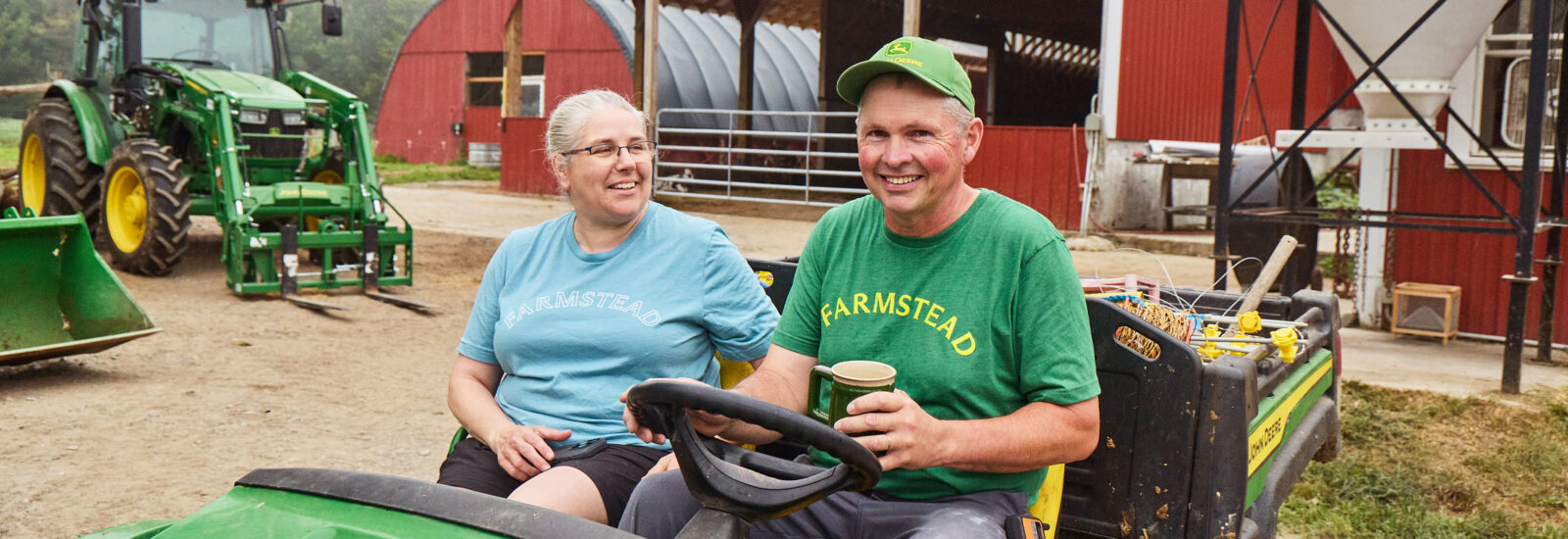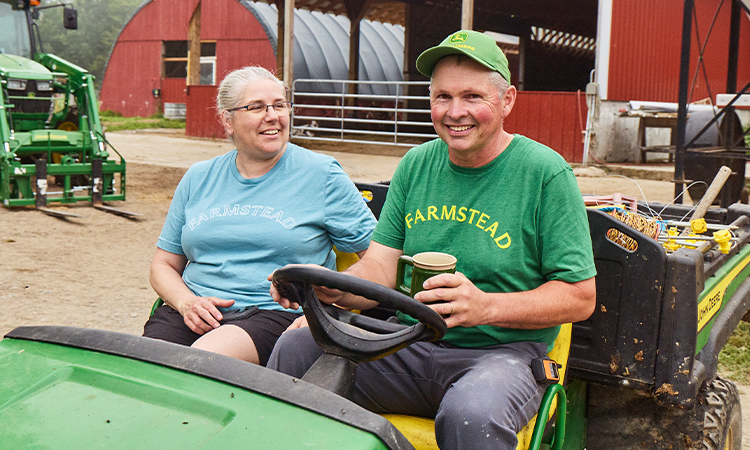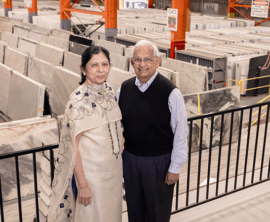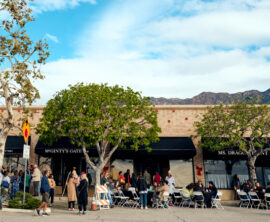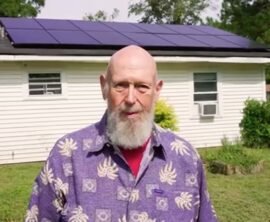Key takeaways
- Affordable renewable energy: Balfour Farm is one of dozens of businesses that have benefited from a Wells Fargo grant, making loans for solar arrays more affordable.
- Small business success: The off-grid dairy farm in rural Maine produces organic handmade cheeses with power produced by 60 solar panels. A battery system stores energy to help keep the farm’s operations running around the clock.
- Fostering sustainability: Coastal Enterprise, Inc., or CEI, a Community Development Financial Institution (CDFI) based in Maine, uses grants like the one from Wells Fargo to lower the interest rate borrowers pay on their low-cost solar loans.
- Growing energy resilience: Solar arrays like these are vital for many businesses in Maine as the state faces utility rate hikes and long power outages caused by storms and aging infrastructure, according to Emily Wood, a CEI program director.
Aside from the cows grazing out in the field and farmers making cheese, the sun is among the most important producers on Balfour Farm.
That’s because the sun’s rays don’t just help the grass grow at this dairy farm in central Maine. They’re harnessed by an array of solar panels and batteries, serving as the off-grid farm’s primary energy source.
The bright sunshine is a key ingredient in Doug and Heather Donahue’s creamy goudas and fresh chevre-style cheese. It even powers the heat pumps in the farm’s cheese cave to age smoky cheddars.
“Most of the energy to make our food comes from the sun,” said Heather, who co-owns and operates Balfour Farm with her husband.
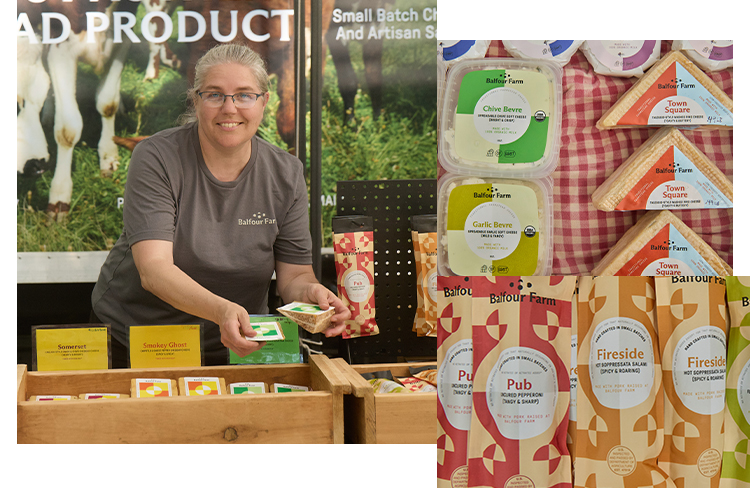
Co-owner Heather Donahue sells Balfour Farm’s organic, farmstead products at local markets, including the farmers market in Portland, Maine.
Credit: John Huba
The 100-acre farm is among several Maine businesses that have adopted renewable energy with the help of a Wells Fargo grant, making solar loans more affordable. On-site solar arrays are increasingly critical for farmers like the Donahues and the state’s other businesses in the face of utility rate hikes, power outages, and grid instability.
“We have really high energy costs here,” Heather said, “and power costs just keep going up and up and up.”
Why a dairy farm made the switch to renewable energy
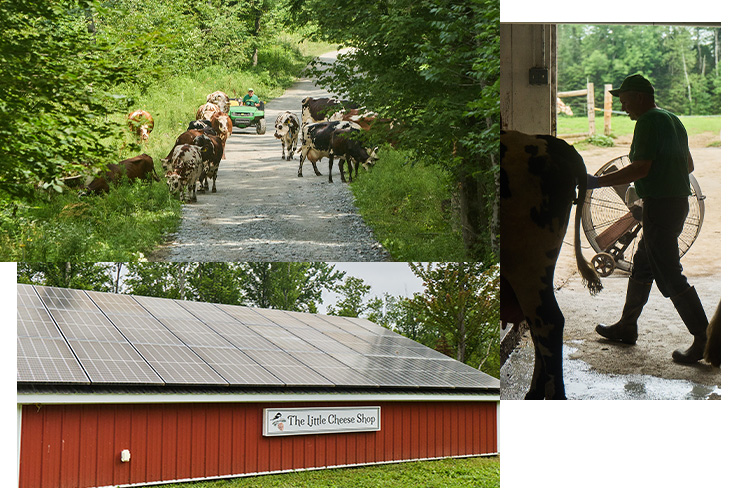
Around 7:30 a.m. each morning, Doug and Heather Donahue move their roughly 20 Normande cows out in the field.
Credit: John Huba
At first, the Donahues invested in a single solar array to avoid high installation costs to connect to the electrical grid, which would cost nearly six figures, Doug said. But the initial solar array wasn’t enough. To meet its energy needs, the farm still relied on a diesel generator costing $700 a month.
Then, the Donahues turned to Coastal Enterprise, Inc., or CEI, for a loan to add more solar panels and battery storage. Ultimately, the arrays provide 90% of the farm’s electricity needs, and the generator still does the rest — now running for just an hour a day.
“The Donahues can keep the lights on when others cannot,” said Emily Wood, a CEI program director. “When you have a very large, sparsely populated state [like Maine], bringing energy across large sections of land is very expensive.”
The local CDFI’s low-cost solar financing program is subsidized by grants from companies like Wells Fargo to bring down the interest rate, making the loan and arrays more affordable by lowering borrowers’ monthly payments.
A $250,000 Wells Fargo grant has helped 24 businesses borrow nearly $2.5 million to buy solar arrays under CEI’s program, Wood said. Another $50,000 grant supported the organization’s efforts to educate small businesses about the program to help them decide whether solar is right for them.
Investing in a more resilient energy option like solar arrays and batteries is key for the state’s “nature-based economy,” Wood said, which heavily relies on farms, fisheries, and natural resources. And unlike other areas, many businesses in Maine rely on backup generators due to frequent power outages caused by storms and an aging grid, which might otherwise cause them to lose money, she added.
“We have a very old grid,” Wood noted. “Some of our transmission lines were established when electricity was literally first connected in Maine.”
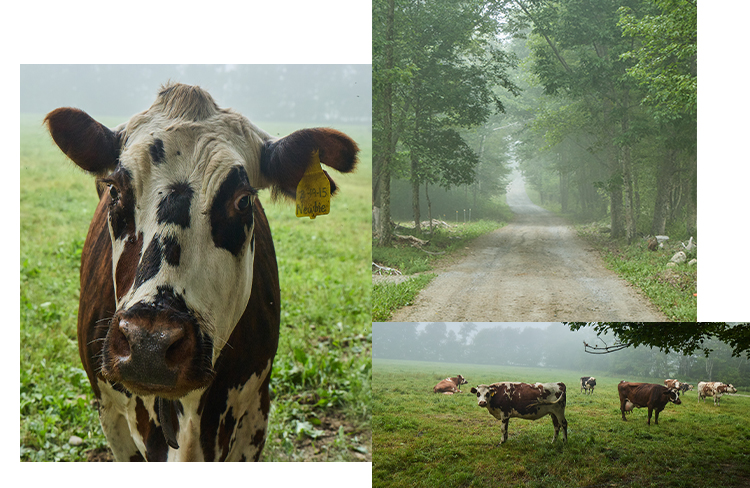
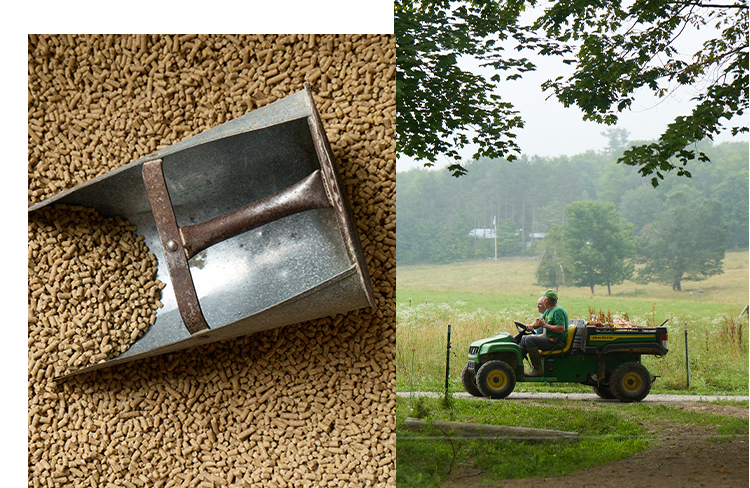
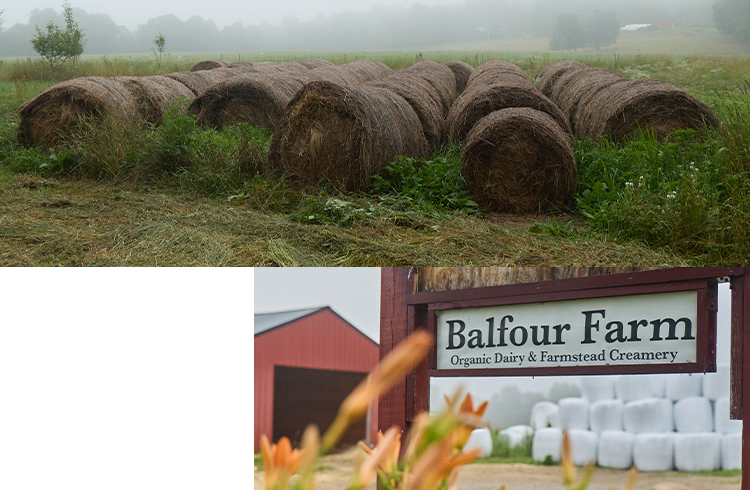
Cows like 10-year-old Newbie (pictured) and her offspring Renew and Eloise are raised directly on site by Heather, Doug, and the farm’s livestock manager.
Credit: John Huba
Half of CEI’s low-cost solar borrowers have been farms, which makes sense because of their typically small profit margins and need to plan, Wood said. Because they rely less on the main electrical grid, having a solar array means they don’t have to worry about rate hikes in the middle of a growing season. Typically, these arrays pay for themselves within a few years, she added, or even faster if paired with other grants.
“This loan product has really spoken to the needs of farmers,” Wood said. “Locking in an energy price … for a small business trying to plan ahead is huge.”
The predictable cost of the loan was key for Balfour Farm, whose cheeses and meats are farmstead products, which means each step of the small-scale, “closed loop” process happens on site, Heather said. That starts with the calves the Donahues raise — and name —themselves, and it ends with packaging aged cheeses by hand.
“If you pasteurize a lot in a month, you could almost double your electric bill,” Heather said. “If you wholesale [your product], you’re going to wait 60 days to recoup the sales on those products.”
[Video overview: Doug and Heather Donahue, owners of Balfour Farm in central Maine, share their journey of purchasing their 100-acre farm in 2010 and creating a sustainable, off-the-grid operation. The video highlights their closed-loop system where they graze cows, produce milk, and process cheese all on the farm. It also showcases their solar power project, supported by Wells Fargo and Coastal Enterprise, Inc. (CEI), which helped them to become completely self-sufficient.
Visuals: A peaceful rural farm setting, cows grazing, owner interviews, cheese processing, working farm.
Audio: Spoken words from farm owners, and light guitar music.
Accessibility: Captions are provided throughout. No flashing lights or rapid transitions are present.]
[Music]
[On-screen text: Doug Donahue — Co-owner, Balfour Farm]
My name is Doug Donahue, and I own Balfour Farm along with my wife Heather.
[Heather Donahue]
We purchased our farm in 2010, and it’s a 100-acre farm located in central Maine.
[On-screen text: Heather Donahue — Co-owner, Balfour Farm]
So, on Balfour Farm we have a closed-loop system. We actually graze the cows, we make the milk, and we process the cheese all right here on the farm.
[Doug Donahue]
We had originally talked to the power company about bringing power out to the barn, and it was going to cost us about $100,000 to run the lines out here, and decided that if we’re going to spend that amount of money we would be better off investing it in our own power system.
[On-screen text: Emily Wood — Program Director, Coastal Enterprise, Inc. (CEI)]
My name is Emily Wood. I’m the program director for climate work at CEI, Coastal Enterprises. Maine is a very rural state. It’s really expensive to connect. And in parts of Maine where your power outage can last a week or longer, for small businesses that can mean a lot of money, thousands of dollars in loss for product. And so, for Balfour Farms it made a lot sense to be an off-grid array, so using solar and battery storage to offset their energy needs instead of connecting to the grid.
[Heather Donahue]
So, Wells Fargo was involved in our solar project in working with CEI, provided us with a reduced rate of interest on the loan. And that really made the difference between us being able to do the project or not.
I don’t think there’s anything I’d rather be doing than farming.
[Doug Donahue]
No, I love to farm, so yeah, we won’t ever do anything different.
[Heather Donahue]
It’d be really hard to go back to a 9-to-5 job.
[Doug Donahue]
Nobody would hire us.
[Laughter]
[On-screen text: © 2025 Wells Fargo Bank, N.A. All rights reserved.]
Watch: Balfour Farm’s small batch, closed-loop dairy and meat operations are powered by 60 solar panels (1:42).
Credit: John Huba
How solar helps businesses build energy independence
By adding solar panels and shifting away from the grid, businesses like Balfour Farm can avoid rate hikes and using battery storage to amplify the arrays’ benefits can increase their resilience.
The farms and other solar loan borrowers that use batteries grow more resilient to outages and storms, Wood said. Along with their new 16-killowat array, the Donahues’ lithium-ion batteries kick in to keep energy flowing when the panels aren’t generating electricity.
“Our panels are facing south, slightly west to get that end-of-the-day sunshine when we know we need it,” Heather said.
An independent spirit is central to Balfour Farm, from its one-of-a-kind artisanal cheese to its off-the-grid solar energy production.
“I don’t think there’s anything I’d rather be doing than farming,” Heather said. “It’d be really hard to go back to a 9-to-5 job.”
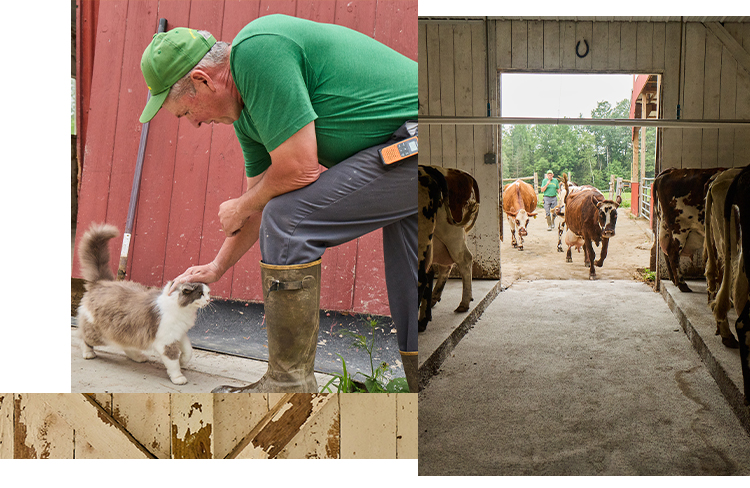
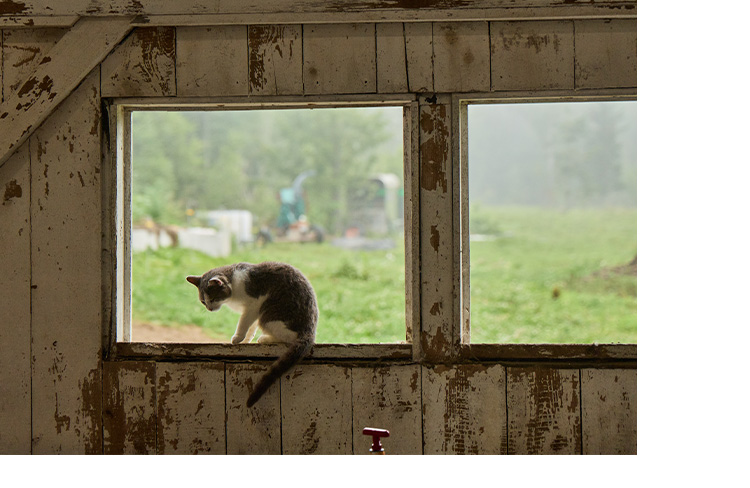
On Balfour Farm, animals are treated with respect, from the drove of 160 or so pigs to the herd of milking cows — and even barn cats.
Credit: John Huba
